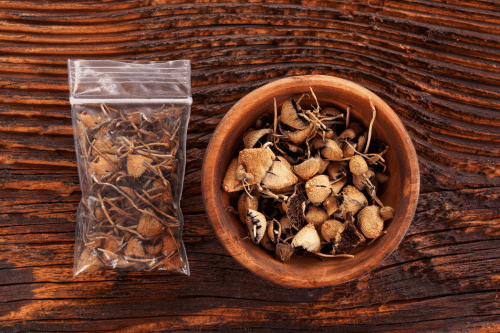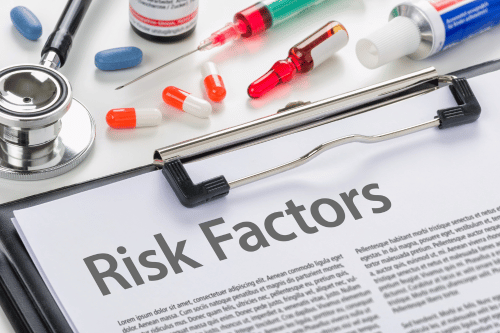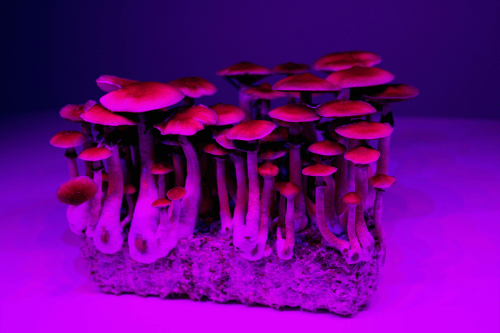How Long Do Shrooms Stay in Your System? |
Shrooms 101
Understanding Psilocybin Mushrooms
Psilocybin mushrooms, commonly referred to as “shrooms,” are naturally occurring fungi with hallucinogenic properties. They have been used for centuries in spiritual experiences and medicinal practices, and in recent years, they have gained popularity in modern therapeutic settings.
What Are Shrooms?
Shrooms are fungi containing psilocybin, a psychedelic compound that induces altered perceptions, sensory experiences, and introspective experiences. These psychedelic mushrooms are typically consumed dried or fresh shrooms and can be brewed into teas or added to foods.
The Active Compound: Psilocybin

Psilocybin is a psychoactive compound converted into psilocin in the body, which interacts with serotonin receptors in the brain. This interaction is responsible for the hallucinogenic effects, which can range from euphoria to profound introspection. The compound’s pharmacokinetics influence how long it stays in your system, with factors like body mass, individual metabolism, and body fat percentages playing a role.
Detection Times for Drug Tests
Drug testing methods are not commonly designed to detect psilocybin or psilocin, but certain specialized drug tests can identify these substances. The detection windows can vary significantly depending on the testing method used, individual factors like metabolism, and the type of drug test being conducted.
Urine Tests
Psilocin is typically detectable in urine drug tests for up to 24 hours after consumption. In some cases, traces may linger for up to three days, especially with higher doses of psilocybin, specific mushroom species consumed, or slower metabolic rates. Urine tests are among the more routine drug tests used, making them a common choice for workplace drug testing.
Blood Tests
Blood tests, a common type of drug test in clinical settings, have a shorter detection window, with psilocin usually remaining detectable for 12-24 hours after ingestion. These tests can provide more immediate results but are less common for psilocybin due to their invasive nature and the brevity of detection windows.
Saliva Tests
Saliva tests are not widely employed for detecting psilocybin or psilocin, but when used, they offer a very limited detection window. Psilocin can typically be identified for only a few hours after consumption. These tests are less effective for hallucinogenic drugs and are rarely included in routine drug tests.
Hair Follicle Tests
Hair follicle tests or hair testing can potentially detect psilocybin-containing mushrooms for up to 90 days. While highly sensitive, these tests are typically reserved for specialized drug tests and are rarely utilized for identifying hallucinogenic substances like shrooms. Factors such as the type of mushrooms consumed and individual hair growth rates can influence the results.
Specialized tests and variations in drug testing methods highlight the importance of considering the specific circumstances, such as the drug’s half-life, when assessing detection windows for psilocybin.
Duration of Effects

The effects of shrooms are temporary but influenced by several factors, including the type of mushroom consumed, dosage, individual metabolism, and method of consumption. Different mushroom species can produce varying intensities of effects and durations, adding to the variability.
Onset of Effects
Effects typically begin 20-40 minutes after ingestion as psilocybin is converted into psilocin in the body. During this phase, users often feel mild euphoria, sensory enhancement, and changes in perception. Additional physical effects, such as increased heart rate or slight nausea, may accompany the onset.
Peak Effects
The effects peak around 1-2 hours post-ingestion and can last up to 6 hours. During this phase, users may experience vivid visual hallucinations, auditory hallucinations, and a distorted perception of time and reality. This psychedelic experience often involves intense emotions and heightened sensory awareness.
After-Effects
Residual effects, such as fatigue, mild confusion, or a heightened sense of introspection, can linger for several hours after the peak. For some, these after-effects may extend into the next day, particularly if a high dose was consumed. The duration and intensity of after-effects can vary widely from person to person based on factors such as body weight, hydration, and overall health.
Factors Influencing Detection
Several variables determine how long magic mushrooms stay detectable in the body, including:
Dosage
Higher amounts of the active ingredient, psilocybin, result in longer detection times, as higher levels of psilocybin lead to prolonged presence in the system.
Frequency of Use
Frequent or chronic users of psychedelic drugs may accumulate the compound in their system, extending the detection window. The effects of shrooms can vary person to person based on usage patterns.
Individual Metabolism
A faster metabolism can accelerate the excretion of psilocybin and its metabolite of psilocybin, psilocin, while a slower metabolism may prolong its presence. Factors such as body weight and body composition also play a role.
Body Composition
Body fat percentages and hydration levels influence the elimination process and detection time. Fatty tissues can potentially retain compounds for longer periods, contributing to variability in the drug’s half-life.
Other considerations include the type of mushrooms consumed, potential for abuse, and the unpredictable effects on heart rate and body temperature during a shroom trip. These aspects emphasize the need for informed decisions when using hallucinogenic mushrooms.
Safety and Risks Associated with Shroom Use

While psilocybin mushrooms are generally considered low-risk compared to other substances, they are not without potential dangers. Understanding these risks is crucial for making informed decisions about their use.
Side Effects of Psilocybin Mushrooms
Common side effects of shrooms include nausea, dry mouth, muscle weakness, and dilated pupils. These physical effects can vary in intensity depending on the dosage and individual sensitivity. Psychological effects may include intense fear, distorted sense of time, and perception disorders, which can lead to discomfort or distress during the experience. Some users also report feelings of paranoia or rapid emotional shifts.
Risks of Overdose
Although fatal overdoses are rare, consuming excessive amounts can lead to severe psychological distress, including a bad trip. Symptoms of a bad trip may involve terrifying hallucinations, disorientation, and irregular heartbeats. In extreme cases, the unpredictability of these hallucinatory effects can lead to dangerous behaviors or acute stress reactions requiring medical intervention.
Psychological Implications
Psilocybin use can trigger latent mental health conditions, such as bipolar disorder or severe anxiety disorders, especially in individuals with pre-existing mental health conditions. For those with underlying vulnerabilities, the effects of psilocybin may exacerbate symptoms or lead to long-term psychological consequences, emphasizing the importance of understanding personal health risks before use.
Strategies to Accelerate Elimination from the System
To reduce the time psilocybin remains in your system, consider these strategies:
Hydration
Drinking water helps flush psilocybin metabolites from the body. Staying consistently hydrated supports kidney function, which plays a key role in the elimination process. Additionally, fluids help maintain body temperature and prevent dehydration, which can slow down metabolic processes.
Exercise
Physical activity and social activities can boost metabolism, aiding in faster elimination. Aerobic exercises, such as running or cycling, increase heart rate and improve circulation, accelerating the removal of toxins. Incorporating consistent movement into daily routines can enhance overall detoxification efforts.
Diet Considerations
A balanced diet rich in fiber and antioxidants supports the detoxification process by promoting digestive health and liver function. Foods like leafy greens, citrus fruits, and whole grains help eliminate waste more efficiently. Avoiding processed foods and alcohol can further optimize the body’s natural cleansing abilities. Including hydrating foods, such as cucumbers and watermelon, can provide additional support to the elimination process.
Recognizing Signs of Addiction
While psilocybin is not typically associated with physical dependence, signs of shroom addiction can occur and may require intervention from healthcare professionals or addiction specialists.
Behavioral Indicators
Obsessive thoughts about using shrooms, neglecting daily responsibilities, or using them for recreational purposes despite negative consequences are warning signs. Behavioral therapy or cognitive-behavioral therapy can be helpful in addressing these issues.
Physical Dependence
While rare, some individuals may develop cravings for the psychoactive compound psilocybin and its psychedelic effects. Withdrawal symptoms, though uncommon, may include negative thought patterns and psychological aspects of addiction.
When to Seek Help
If shroom use interferes with daily life, relationships, or mental health, it is crucial to seek support. Medication-assisted treatment, holistic therapies, or family therapy within a structured environment can address aspects of addiction effectively and support recovery.
Therapeutic Applications of Psilocybin
Emerging research highlights the therapeutic potential of psilocybin mushrooms when used in controlled settings.
Mental Health Benefits
Studies suggest psilocybin may help alleviate symptoms of depression, anxiety, and PTSD. It has also shown promise in reducing addiction to other substances, such as alcohol and nicotine.
Research Studies and Findings
Clinical trials have demonstrated psilocybin’s ability to promote neuroplasticity and provide long-term recovery benefits with minimal side effects.
Legal Considerations
The legality of psilocybin mushrooms varies by location and is evolving due to changing perspectives on their potential therapeutic benefits and low risk for addiction.
Legality of Psilocybin Mushrooms
In most countries, psilocybin mushrooms are classified as controlled substances, making their possession, sale, and use illegal. However, regions like Central and South America have historically used them for traditional and spiritual purposes, often as part of cultural ceremonies. This history has influenced modern perceptions, encouraging some governments to re-evaluate their legal status.
Recent Changes in Legislation
Some U.S. states, such as Oregon and Colorado, have taken steps to decriminalize or legalize psilocybin for therapeutic purposes. This shift has paved the way for evidence-based treatment options in supervised settings. These changes reflect a growing acknowledgment of psilocybin’s potential to treat mental health conditions like depression and PTSD. Other countries are also exploring pilot programs and research initiatives to assess its benefits while maintaining strict regulatory oversight.
Conclusion
Understanding how long psilocybin mushrooms stay in your system requires consideration of various factors, including the type of drug test, individual metabolism, and dosage. Different types of mushrooms and methods of consumption can further influence detection times and effects. While psilocybin shows promise in therapeutic applications, such as aiding mental health issues like depression and PTSD, its use carries risks including potential psychological implications and legal consequences.
For those struggling with substance use disorder or the effects of shrooms, treatment centers provide a safe, structured environment where individuals can access compassionate professionals and effective detox processes. Comprehensive programs often include cognitive-behavioral therapy, family therapy, and holistic approaches tailored to long-term recovery needs. Additionally, these centers offer ongoing support post-treatment, ensuring individuals have the resources needed to maintain sobriety and improve their overall quality of life.
Visit SAMHSA for more information or contact us today.
Frequently Asked Questions
The effects of psilocybin mushrooms typically last between 4 to 6 hours, depending on factors such as dosage, the type of mushroom consumed, and the individual\u2019s metabolism. The onset of effects usually begins within 20-40 minutes after ingestion, with peak effects occurring around 1-2 hours. Residual effects, such as introspection or fatigue, may linger for several hours after the primary experience.
Standard drug tests, such as 5-panel or 10-panel tests, typically do not screen for psilocybin or its metabolites. However, specialized tests, such as hair follicle or urine tests, can detect the presence of psilocybin or psilocin. Detection windows vary: psilocin may be present in urine for up to 24-72 hours and in hair samples for up to 90 days, depending on the individual\u2019s usage and metabolism.
Using psilocybin mushrooms for recreational purposes carries risks such as experiencing a bad trip, which may involve intense fear, paranoia, or distressing hallucinations. Other potential risks include negative psychological effects, exacerbation of pre-existing mental health issues, and physical effects like nausea or rapid heart rate. Consuming poisonous mushrooms mistaken for psilocybin mushrooms can lead to severe health consequences.
While psilocybin mushrooms are not considered physically addictive, psychological addiction is possible. Some users may develop a dependency on the psychedelic effects to escape daily life or unresolved issues. Signs of addiction can include obsessive thoughts about use, neglecting responsibilities, and using the substance despite negative consequences. Professional support, such as behavioral therapy or addiction counseling, may be necessary in these cases.
Yes, emerging research suggests psilocybin mushrooms have therapeutic potential, particularly in treating mental health conditions like depression, anxiety, PTSD, and addiction. Controlled clinical studies have shown psilocybin\u2019s ability to promote neuroplasticity and facilitate introspection in structured, supportive environments. However, these benefits are most effectively realized under the supervision of medical professionals, not through unsupervised recreational use.





